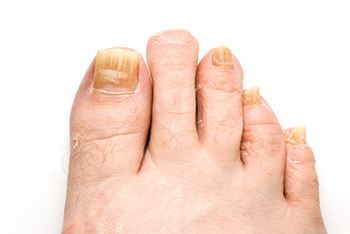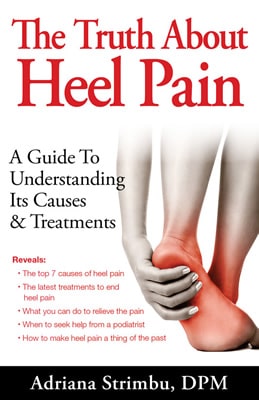
You are here because you or someone you love have toenail fungus or think you might have toenail fungus.
Do you have yellow, hard, thick, brittle, ugly toenails?
Are they so thick that the lift up from the toe or they break?
Is there like a white flour like substance under your toenails?
Is there a mal-odor coming from your toenails?
If you answered yes to any of these questions, you might have toenail fungus.
How to get rid of toenail fungus?
You do not have to wonder anymore. Come for an evaluation with our podiatrist and find out the best ways to get rid of your toenail fungus including our cutting edge Class IV Remy laser treatment for toenail fungus removal. We are here to help you clear your toenail fungus. Our podiatrist will evaluate your discolored, thick, hard fungus toenails and discuss with you the best ways to treat your toenail fungus.
We invite you to schedule your appointment with our experienced Hallandale Beach podiatrist, Dr. Adriana Strimbu, by calling (954) 455-9404 or book an appointment online here now.
What is toenail fungus?
Toenail fungus is a fungal infection of your toenail. It is also called Onychomycosis or Tinea Unghium.
5 Types of Onychomycosis / Toenail Fungus
- Superficial Onychomycosis- is fungus that is superficially on the toenail and sometimes only a small whitish dot on the toenails. It did not invade deep into your toenail.
- Distal Onychomycosis- is fungus that is only present at the distal part of the toenail more toward the end / tip of the toenail and the base of the toenail is clean.
- Proximal Onychomycosis- is fungus that is only present at the proximal aspect of the toenail, close to the skin and at it's root. In this type, the distal part of the toenail is clean.
- Candida Onychomycosis - is fungus that is caused by a yeast infection and usually also the skin around the toenail looks inflammated.
- Total Onychomycosis - is fungus that has infected the entire toenail and the the toenail looks very hard, thick, discolored and can break very easily. With this type of fungus, usually people will have athlete's feet present as well.
Conditions That Can Be Mistaken With Toenail Fungus
- Psoriatic toenails - toenails that have pits into them. These toenails are affected at the nail matrix. Also any other conditions that affected the nail matrix can get pits into them. These toenails can also be tan in color.
What type of treatments are available for toenail fungus?
The following are some of the treatments available for toenail fungus:
- Topical antifungal medication
- Oral antifungal medication
- Laser fungus toenail treatment like Remi Class IV therapy
Common Questions About Toenail Fungus
What does toenail fungus looks like?
Toenails that have fungus on them are discolored (yellow, brown, white), hard, thick, brittle, some can lift up from the toe and may break easily. Also some fungus toenails have like a white, powdery substance under them just like flour. This flour like white powder under the toenails is the fungus eating from under your toenail. This is what can detached the toenail from your toe. And i some cases these fungus toenails can come off very easily.
What does toenail fungus looks like?
Toenails that have fungus on them are discolored (yellow, brown, white), hard, thick, brittle, some can lift up from the toe and may break easily. Also some fungus toenails have like a white, powdery substance under them just like flour. This flour like white powder under the toenails is the fungus eating from under your toenail. This is what can detached the toenail from your toe. And i some cases these fungus toenails can come off very easily.
Does toenail fungus hurt?
In general, toenail fungus does not hurt. However, if the toenails become very hard and thick, they can cause pressure on the skin and borders and the toes can become painful.
What causes toenail fungus? What are the risk factors?
Toenail fungus is caught by warm, moist, wet areas, such as common showers and swimming pools like at the gyms or any other common areas. Athletes are more predisposed to toenail fungus especially when wearing tight shoes and due to wearing closed toe shoes which is perfect area for fungus to form since it is a dark, worm, moist and wet environment. Toenail fungus can also be due to chronic trauma. This is because trauma weakens the toenail and makes it more prone to fungus.
Who gets fungal toenail infections?
Anyone can get fungal toenail infections. But it is most common in the elder population and people with a weaker immune system.
Is toenail fungus contagious?
Yes, it is contagious, but not highly contagious. It can spread from person to person.
Can toenail fungus spread to other parts of your body?
Yes, toenail fungus can spread to the skin of the feet causing athlete's feet.
Who is most predisposed to get toenail fungus?
Most predisposed to get toenail fungus are people with the following conditions:
- Diabetes
- Peripheral arterial disease
- A weak immune system
- Toenail trauma or surgery
- Athlete's feet
How did I get a toenail fungus?
Toenail fungus can be caused by several fungal organisms. The most common organisms are dermatophytes, but it can also be caused by yeast and/or molds. The most common dermatophyte that causes toenail fungus is Trichophyton rubum.
Can toenail fungus confused with other toenail problems?
Yes. Toenail fungus can be easily confused with other toenail disorders. And because of this, it is important to consult with a health care specialist that is very knowledgeable about toenail disorders. Our podiatrist, Dr. Strimbu has treated a large amount of patients with toenail fungus and has extensive knowledge about toenail fungus. To have your discolored, thick, hard, ugly fungus toenails evaluated and treated, we invite you to call our podiatry office in Hallandale Beach to schedule an appointment at (954) 455-9404 or book your appointment online now.
What tests are used to diagnose toenail fungus?
In order to diagnose toenail fungus, a small piece of your toenail is taken and sent to the laboratory for evaluation.
Is there a medical pedicure facility near me?
Dr. Adriana Strimbu, DPM, Hallandale Beach foot doctor, provides medical pedicures in her office.
Can a podiatrist diagnose and treat toenail fungus?
Yes. Podiatrist is highly trained healthcare professional in diagnosing and treatment of toenail fungus.
Should toenail fungus be treated?
Yes. Toenail fungus should be treated. If left untreated, it can multiply and affected other toenails and can spread to the skin as well causing athlete's feet. This can cause also bacterial infections especially in the diabetics, patients with circulatory problems and any patients with a weak immune system.
Are oral antifungal medications toxic?
Oral antifungal medications for toenail fungus can be toxic to your liver. But they are unlikely to cause liver damage in a healthy patient. However, it is indicated that blood tests be done before and during the oral antifungal treatment to monitor the liver enzymes.





